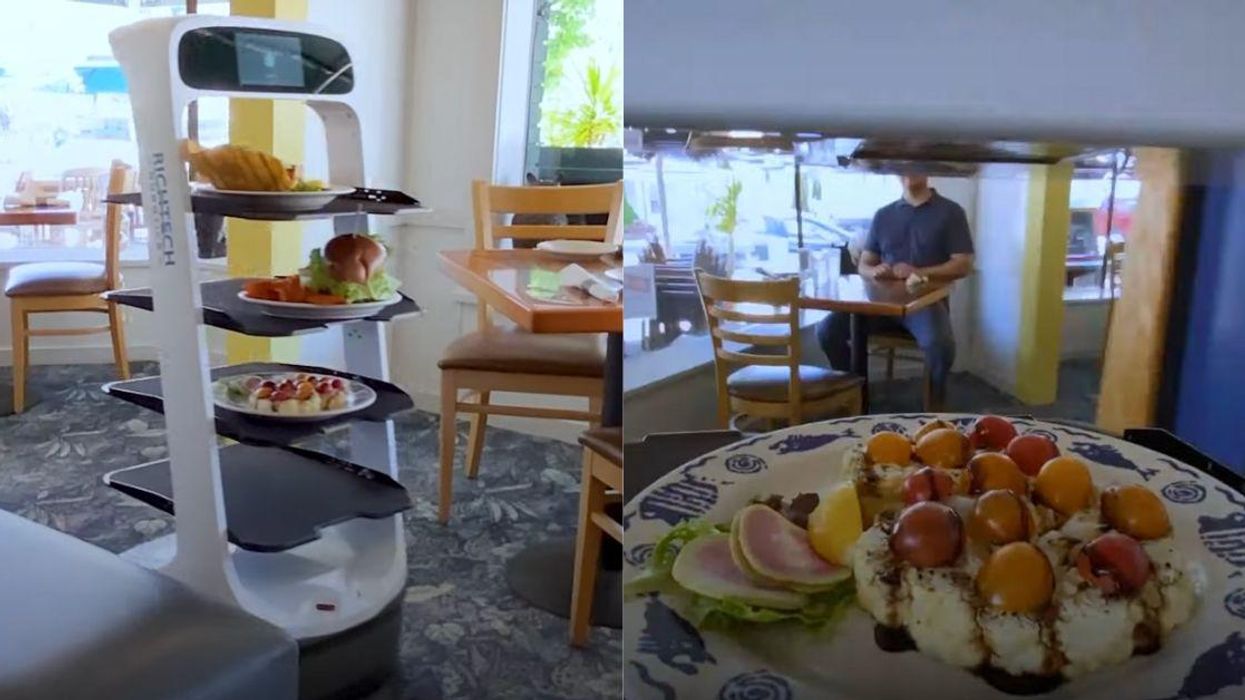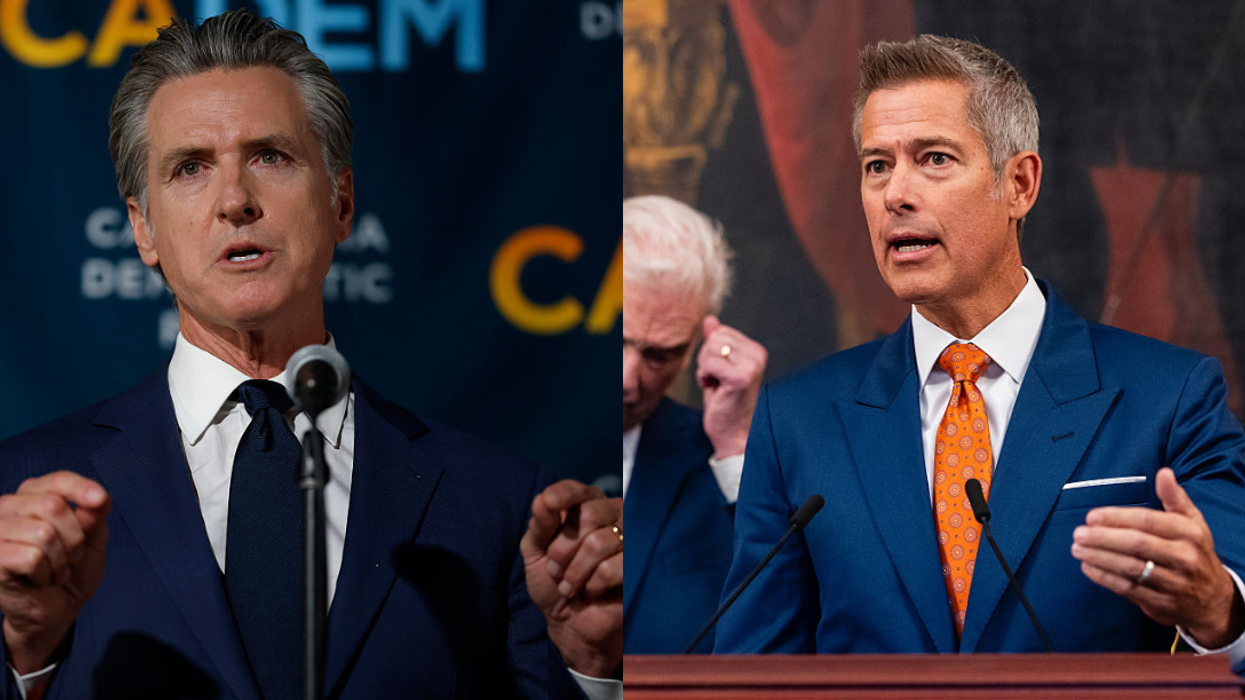As a nationwide labor shortage slows and even stops many businesses, especially in foodservice, one New Jersey restaurant has resorted to an unlikely solution: robot waiters.
It may seem like a fascinating technological breakthrough, but to many the restaurant's move speaks to the dark underbelly of the labor shortage. Many business owners are simply refusing to raise wages sufficiently to attract workers.
And after a year of upheaval, many workers are unwilling to work 40+ hours but still be unable to afford rent, food, utilities, healthcare or childcare.
The New Jersey restaurant is drawing outrage for being willing to pay for a robot, but not increase salaries for actual workers.
This N.J. restaurant hired a robot server to battle labor shortage (VIDEO) https://nj-ne.ws/qRk4hYt\u00a0pic.twitter.com/drn0Al93mX— njdotcom (@njdotcom) 1621441270
The robot, called "Peanut" by its manufacturer, Richland Laboratories, has been waiting tables at the Island Grill in Ocean City, New Jersey because owner Andrew Yoa has been unable to staff 60 open positions.
As he told NJ.com:
"Right before we we were ready to open this season, my wife was like, 'We have no servers.' I said, 'What are you talking about?' We have like, three applications. And we usually have 100 or 200, or 300."
So Yoa leased Peanut from Richland Laboratories. Peanut isn't the only server in the restaurant—it works alongside Yoa's skeleton crew in order to pick up some of the slack left by so many open positions.
Yoa says most of his diners think Peanut is so cool they get disappointed when they have a human server. But many on the internet were outraged by Yoa's story.
The nationwide labor shortage has become a hot-button issue of late, as conservatives and many business owners try to pin the blame on extended unemployment benefits due to the pandemic, saying workers would rather collect benefits than return to work.
But economists say that explanation doesn't bear out.
Labor shortages nearly always result in wage increases as business owners try to attract workers. Overall, wages are not rising during this labor shortage, leaving many to conclude low wages, along with other concerns like lack of childcare due to closed schools and continued fears about the virus, are to blame.
Recent stories, like that of a Pittsburgh ice cream parlor suddenly inundated with job applications after raising its pay rate to $15 per hour, bear this theory out. Small workers' strikes that hit foodservice establishments in recent weeks seem to indicate as well many people simply are no longer willing to work for the bargain-basement pay rates most foodservice jobs provide.
And it was that dynamic that had many people online infuriated by the story of Peanut the robot waiter.
They'll hire a robot before they pay a human a living wage.https://twitter.com/njdotcom/status/1395051916418338820\u00a0\u2026— Chris Rockwell (@Chris Rockwell) 1621441360
There is no labor shortage, there are only employers who would rather lease a robot than pay you a living wagehttps://twitter.com/njdotcom/status/1395051916418338820\u00a0\u2026— jack (@jack) 1621441569
They were so unwilling to pay a live-able wage, that they went and got a robot.https://twitter.com/njdotcom/status/1395051916418338820\u00a0\u2026— Dewman (@Dewman) 1621441587
Or, NJ restaurant hired a robot server to avoid paying a fair wage to humans.\n#fixedit— Mary-Beth (@Mary-Beth) 1621442638
Lmao they\u2019d rather drop thousands on this stupid robot instead of just paying their employees a livable wage— rat facts, PhD (@rat facts, PhD) 1621442220
@karenhunter @DrewMcCaskill @afrostateofmind \n\nIs this where we're now heading? Smdh...https://www.dailydot.com/debug/restaurant-robot-server-labor-shortage/\u00a0\u2026— JB (@JB) 1621612302
in other news restaurants have started using robots to replace servershttps://twitter.com/RBReich/status/1395065131785064449\u00a0\u2026— donald chump (@donald chump) 1621449204
Just raise the wages.— Cyndi Gill, Esq. (@Cyndi Gill, Esq.) 1621471772
"Restaurant owner decides to offer customers terrible service rather than pay workers a livable wage"— David (@David) 1621471286
There isn't a labor shortage, there's just a bunch of petty tyrants used to having substandard wages subsidize their failing businesses who are having a reckoning.— Jeff "Fifth Spherical" Krisko (@Jeff "Fifth Spherical" Krisko) 1621441691
For his part, Yoa defended his lease of Peanut as a temporary solution to a hopefully temporary problem. He stressed Peanut would never be able to keep up with the pace of his restaurant under normal circumstances.
Time will tell whether robots like Peanut become a permanent fixture in restaurants.














 Hide Blanket GIF by Instanietje
Hide Blanket GIF by Instanietje  Foam Reaction GIF
Foam Reaction GIF  Mental Health Therapy GIF by All Better
Mental Health Therapy GIF by All Better 

 Friday Driving GIF by FIA World Rally Championship
Friday Driving GIF by FIA World Rally Championship  episode 11 bad food GIF
episode 11 bad food GIF  talking homer simpson GIF
talking homer simpson GIF 
 Cartoons Button GIF by Nickelodeon
Cartoons Button GIF by Nickelodeon 
 @DanTML_/YouTube
@DanTML_/YouTube @voeqx7894/YouTube
@voeqx7894/YouTube @hendrxx9593/YouTube
@hendrxx9593/YouTube @anakinskywalker8877/YouTube
@anakinskywalker8877/YouTube @getshiddonn/YouTube
@getshiddonn/YouTube @sachmanyo/YouTube
@sachmanyo/YouTube